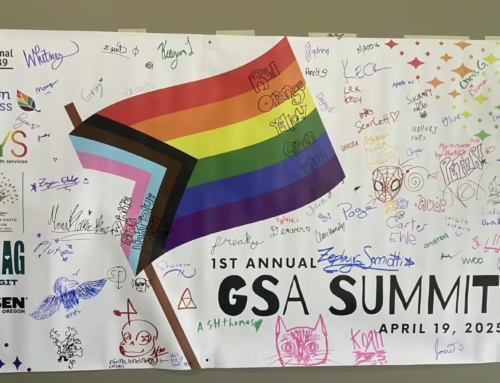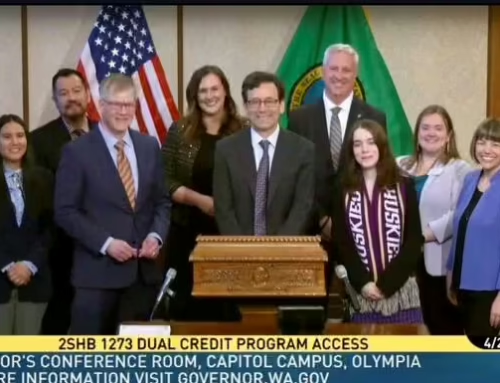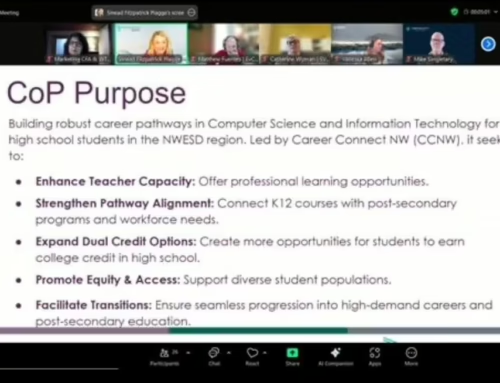In this series of blog posts: “Promising Practices During Long-term School Closure (LTSC)” our goal is to highlight teaching methods that provide equitable access and student/teacher successes in our region during the COVID-19 disruption.
As educators, learning is at the heart of all we do. We all know we need to adapt and change with the current circumstances, but that can be frustrating for everyone (students, parents, and educators alike). If we can recalibrate and approach these challenges with a growth mindset, being intentional in our quest to learn as we go, we will also get better as we go! Right now, educators are working hard to prepare for the upcoming school year, our hope is that by sharing the success and/or learnings within the education community, these stories and ideas will help educators connect with each other and spark inspiration in classrooms. Because we are all in this together #TogetherWeCan!
Spotlight on Michelle Kiehn, NWESD Early Learning Fellow, Mount Vernon School District
 Connecting: During the LTSC in March, early learning educator Michelle Kiehn was able to engage with all but three of the students in her Kindergarten class (18 total students). Michelle said, “I made weekly phone calls or sent emails to parents until they were able to get online. After that, I made bi-weekly phone calls to check in and see how their kids were doing with schoolwork. If parents were struggling to get their kids to do work, I would try to connect with their students in a ‘Google Meet’ session to talk to them. I even met with one student with his older sister outside the school and showed them how to get onto the online classroom and access assignments.”
Connecting: During the LTSC in March, early learning educator Michelle Kiehn was able to engage with all but three of the students in her Kindergarten class (18 total students). Michelle said, “I made weekly phone calls or sent emails to parents until they were able to get online. After that, I made bi-weekly phone calls to check in and see how their kids were doing with schoolwork. If parents were struggling to get their kids to do work, I would try to connect with their students in a ‘Google Meet’ session to talk to them. I even met with one student with his older sister outside the school and showed them how to get onto the online classroom and access assignments.”
Technical support: Michelle had to wear many hats during the LTSC. Providing technical assistance to family members trying to access Google Classroom and other resources was one of them. Michelle used a whatever-it-takes approach (sometimes talking to students or parents on the phone at 10 PM, loads of patience and empathy, and a deep appreciation for family members’ willingness to persevere and partner with her).
Low-tech engagement: With a focus on meeting students and families where they were with technology, Michelle was able to concentrate on student learning by offering low-tech options for engagement. For example, students were given paper packets until they could get school-issued Chromebooks. Once Chromebooks were available, she worked to get all students online. Michelle said, “I had one student who I was doing homework with during a Google Meet session. She was unable to get her homework done independently while mom was at work, so she would stay on after the ‘Google Meet’ with the whole class, I would open that slide assignment, and she would tell me what to put where.”
Recorded stories with themes: Michelle recorded three stories every week for her students to watch whenever they could. Two were always social-emotional stories. One was always a fun story. The fun story usually had a comprehension activity that went with it in the form of a Google Slide deck. At the end of the activity, students told her if they liked the book. Then Michelle usually picked next week’s “fun” story based on their feedback. Michelle said she read a lot of Froggy and Pigeon books for her students asynchronously with an eye on meaningful engagement. Michelle said, “I treated this just like storytime in my classroom. I would ask questions, expect the students to make predictions, turn and talk to a partner (even if it was a stuffed animal, toy, or blanket).”
Modeling: Michelle encouraged her students to bring anyone who was around (siblings, parents, etc.) to join them and read the book like she would if the students were there with her- pausing and asking questions, giving time for them to think and talk with their family members, etc. This gave parents a model for what read aloud can look like (to build language and comprehension) and made the experience richer than if the students just listened to a story.
Kudos: Sarah Southard, NWESD Early Learning & Migrant Education Program Director noted, “Michelle has been an Early Learning Fellow for the past three years and always offers fun stories, innovative ideas, and fresh perspectives to our discussions. It’s no surprise that she took on the challenges of emergency distance learning with an eye for equity and a “whatever it takes” approach to student and family engagement.”
Fantastic work Michelle and the early learning team at Mount Vernon SD. Thank you for sharing your story and strategies with us, we look forward to checking in with you in the new school year.
If you or a colleague would like to share your own promising practice with the NWESD region please contact communications@nwesd.org




